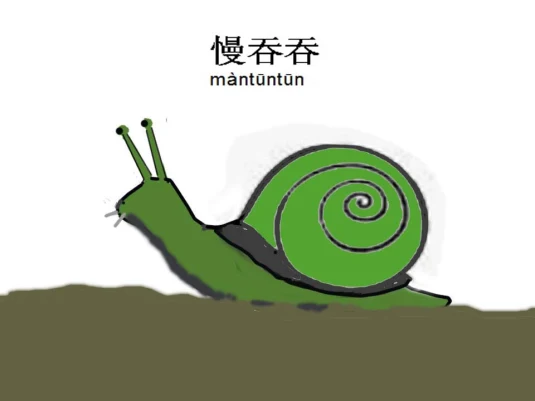
We often use 白白胖胖 (báibái pàng pàng fair-skinned and fat) to describe a chubby baby with cheeks that invite an affectionate pinch. And, 高高兴兴 (gāo gāoxìng xìng glad, gladly) is usually the first phrase that comes to mind when we want to describe being in a good mood.
上图显示著一些大大小小的纽扣.
Shàng tú xiǎnshì zhe yīxiē dà dà xiǎo xiǎo de niǔkòu.
The above picture shows a handful of buttons of various sizes.
Theoretically, you could apply this AABB pattern for any Chinese adjective or adverb. However, many adjectives and adverbs are customarily not repeated in this way. For example, I’ve never heard “美美丽丽” for 美丽 (měilì beautiful), or “悲悲伤伤” for “悲伤 (bēishāng sorrowful)”, or “小小气气” for 小气 (xiǎoqì stingy).
Following are a number of adjectives and adverbs that are commonly duplicated, usually for emphasis.
快快乐乐 (kuài kuàilè lè) happy, happily
和和气气 (hé hé qì qì) polite and amiable, in good spirits
轻轻松松 (qīng qīng sōng sōng) relaxed, easily, without effort
痛痛快快 (tòng tòng kuài kuài) open and direct, without hesitation, with alacrity
大大方方 (dà dà fāng fāng) generous, gracefully
方方正正 (fāng fāngz hèng zhèng) square or upright
高高低低 (gāo gāo dī dī) uneven in height
普普通通 (pǔ pǔ tōng tōng) ordinary
稀稀疏疏 (xī xi shū shū) sparse
朦朦胧胧 (méng méng lóng lóng) hazy
疯疯颠颠 (fēng fēng diān diān) crazy, deranged, erratic
昏昏沉沉 (hūn hūn chénchén) groggy, dizzy and sleepy
慌慌张张 (huāng huāng zhāng zhāng) in a hurry-scurry
恍恍惚惚 (huǎng huǎng hū hū) vaguely, confused, as if in a trance
窝窝囊囊 (wō wo nāng nāng) cowardly
舒舒服服 (shū shū fú fú) comfortable, comfortably
服服贴贴 (fú fú tiē tiē) docile and obedient
安安稳稳 (ān ān wěn wěn) safe and sound
邋邋遢遢 (lā lā tà tà) sloppy, slovenly
踏踏实实 (tà tà shí shí) down-to-earth
地地道道 (dì dì dào dao) authentic, to the core
仔仔细细 (zǐ zǐ xì xì) in great detail, thoroughly, (checking) carefully
清清楚楚 (qīng qīng chǔ chǔ) very clearly
浩浩荡荡 (hào hào dàng dàng) in a grandiose way, said of an army or a large crowd of people
Hungry for more? Here are a bunch of Chinese idioms containing duplicated characters.
气势汹汹 (qìshìxiōngxiōng) aggressive, overbearing
喜气洋洋 (xǐqìyángyáng) full of joy
洋洋大观 (yángyángdàguān) spectcular, extensive
比比皆是 (bǐ bì jiē shì) can be found everywhere, great in number
落落大方 (luòluò dàfāng) graceful, at one’s ease
多多益善 (duōduōyìshàn) the more the merrier
格格不入 (gégébùrù) not fitting in or out of place (said of people)
苦苦哀求 (kǔ kǔ āiqiú) to entreat piteously
赫赫有名 (hèhè yǒumíng) very famous, illustrious
楚楚动人 (chǔchǔ dòngrén) lovely and enchanting (said of delicate women)
卓卓有余 (zhuō zhuó yǒuyú) more than sufficient, having enough to spare
姗姗来迟 (shān shān lái chí) jokingly or sarcastically said of people who arrive late
沾沾自喜 (zhānzhānzìxǐ) to feel smug
津津有味 (jīnjīnyǒuwèi) with keen interest or with relish (as in reading a book)
津津乐道 (jīnjīn lè dào) to talk abut something with enthusiasm.
谦谦君子 (qiānqiānjūnzǐ) a modest gentleman
代代相传 (dài dài xiāngchuán) passed down from generation to generation
头头是道 (tóutóushìdào) clear and logical, well argued, making good sene
口口声声 (kǒukǒushēngshēng) saying repeatedly
家家户户 (jiājiāhùhù) each and every family
四月通常有很多雨天.
Sì yuè tōngcháng yǒu hěnduō yǔtiān.
The month of April generally offers many rainy days.
你听到外面下雨的声音了吗?
Nǐ tīng dào wàimiàn xià yǔ de shēngyīnle ma?
Do you hear the sound of rain outside?
这些自然声音已被证明有助于放松心情.
Zhèxiē zìrán shēngyīn yǐ bèi zhèngmíng yǒu zhù yú fàngsōng xīnqíng.
Such nature sounds have been shown to help relax the mind.
放松下来; 让雨声帮助你集中精力学习这些成语.
Fàngsōng xiàlái; ràng yǔ shēng bāngzhù nǐ jízhōng jīnglì xuéxí zhèxiē chéngyǔ.
Relax; let the sound of rain help you focus on studing these idioms.


Recent Comments